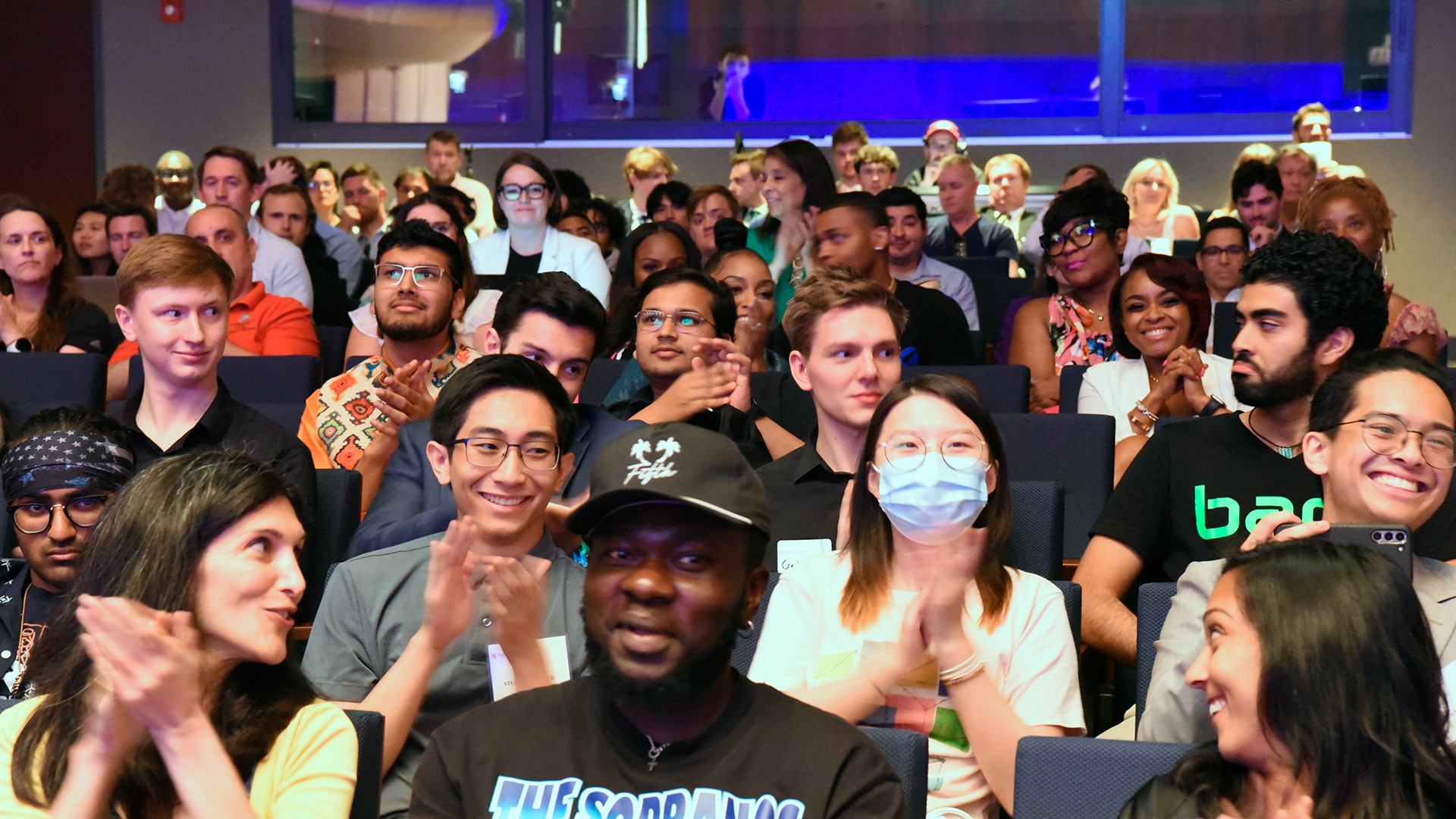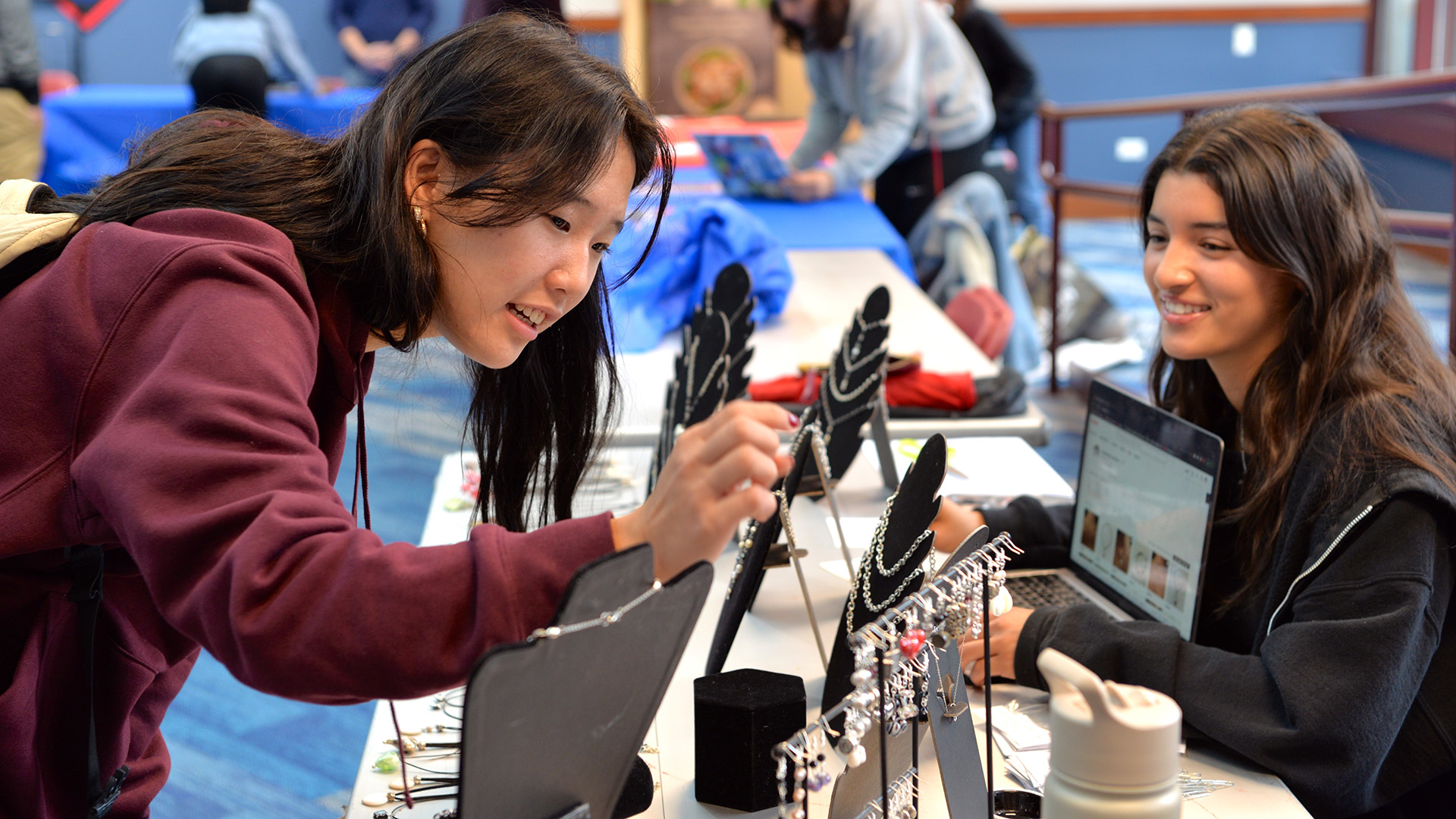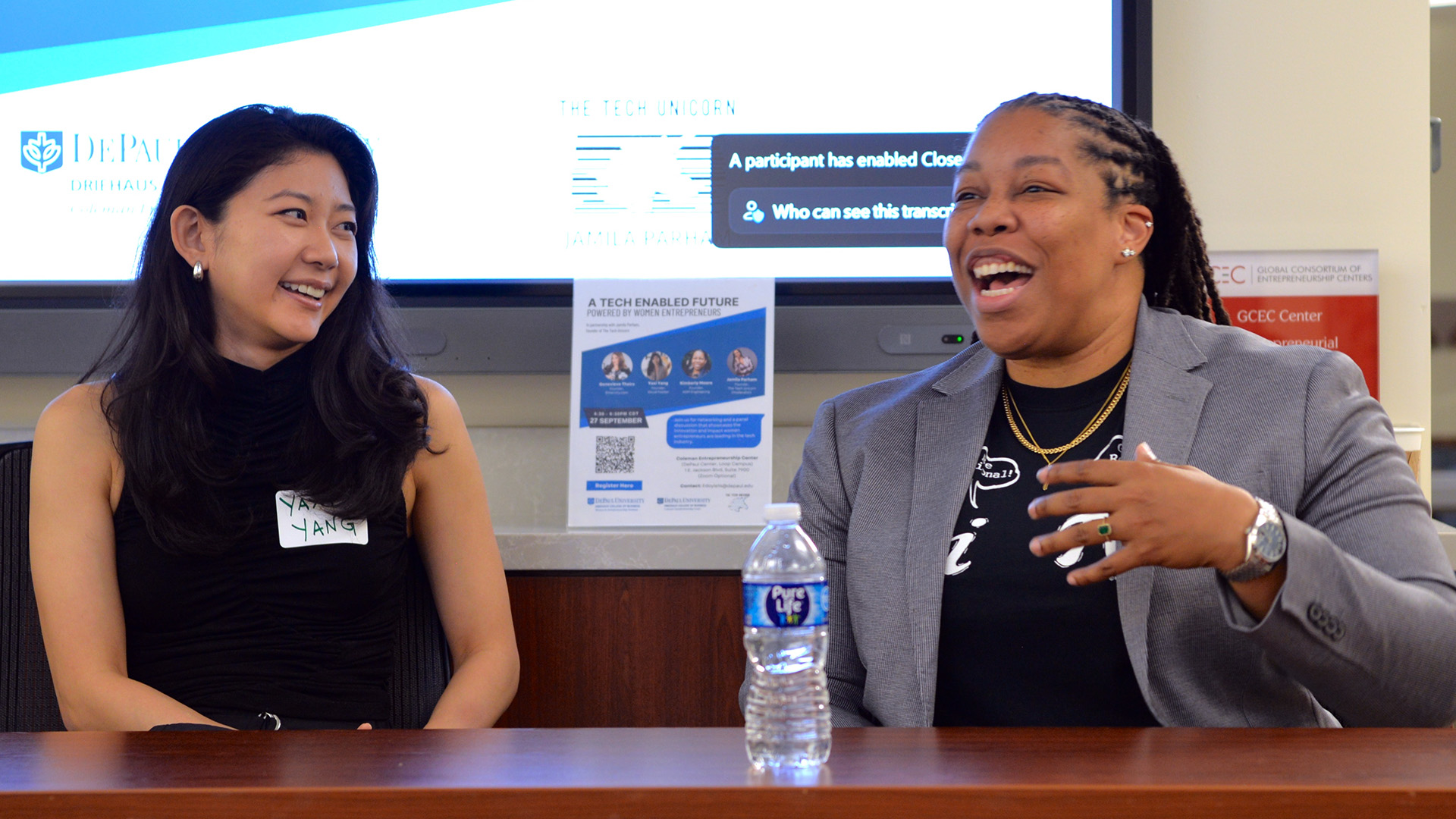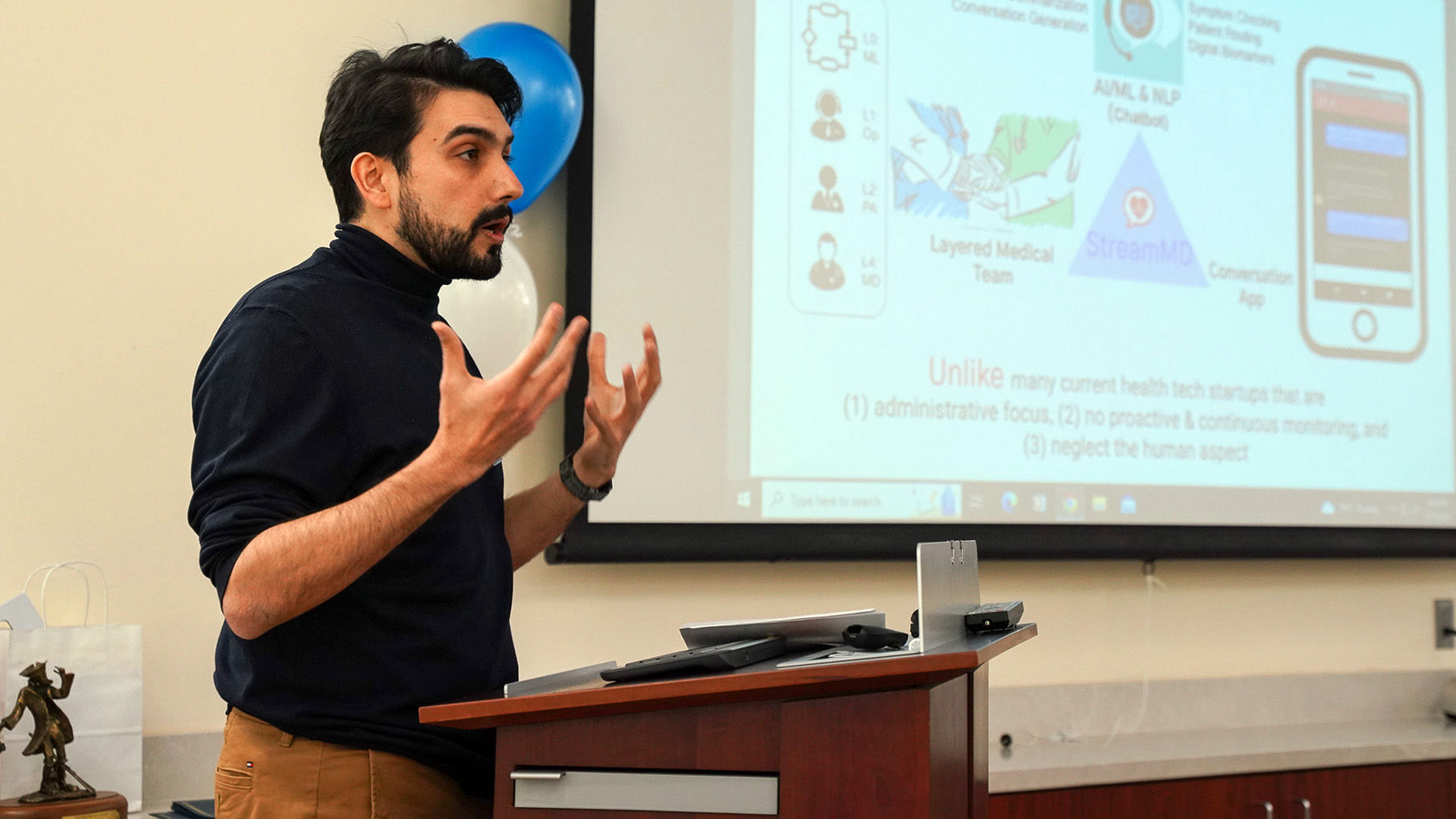Reflecting on 20 Years of Vision and Innovation
Article by Meredith Carroll. Photos by Kathy Hillegonds.
Over the 20-year history of the Coleman Entrepreneurship Center, one definition of entrepreneurship has risen above the rest.
Entrepreneurship at its best is about meeting a need in your community.
“I want to honor the student who walks in here and wants to open a grocery store on the south side of Chicago because there isn’t one — a business that will create jobs, sustain their family.”
It's a definition of entrepreneurship that reflects what’s distinctive about DePaul: A commitment to its Vincentian mission. A commitment to making education accessible to all. Strengthening its deep ties to Chicago and impacting communities around the world as a result.
This work, in turn, has raised the visibility of the Coleman Entrepreneurship Center and Driehaus. At this year’s Global Consortium of Entrepreneurship Centers Conference — which brought together 700 participants from 300 universities across 19 countries — the center won the Nasdaq Center of Entrepreneurial Excellence Award. The award is the highest honor a university entrepreneurship center can achieve.
Local solutions to local needs: A look back
 Students in the audience for University Pitch Madness, an entrepreneurship competition hosted by CEC that brings together student teams from universities across the Midwest.
Students in the audience for University Pitch Madness, an entrepreneurship competition hosted by CEC that brings together student teams from universities across the Midwest.
Harold Welsch (BUS '66, MBA ‘68) was the founding chair of the center. Before entrepreneurship was a buzzword, Welsch taught students much like the ones Leech interacts with today: First-generation college students. Students invested in using business to better their communities.
In the nineties, Welsch’s focus on empowering small-business owners coincided with rising interest in entrepreneurship.
“Harold was kind of the godfather of entrepreneurship,” says Leech. “The people I look up to now — they looked up to him. He saw a need,” says Leech, to equip students to “help their family businesses, help their communities.”
Welsch’s work resonated with Mike Hennessy, CEO of the Coleman Foundation from 1995 to 2020 and a champion of entrepreneurship in Chicago. In 2003, with Hennessy's support and a generous gift from the foundation, the CEC was born.
In 2023, the center's mission — entrepreneurship as a way of meeting a local need — has proven as relevant as ever. If anything has changed, Leech says, it’s the scope. Students aren’t just bringing an entrepreneurial spirit back to communities in Chicago. From
Honduras to India, they’re also making a difference around the world.
A mindset, a skillset, an ecosystem: The CEC’s impact today
A mindset: Cultivating wonder
For Leech, teaching entrepreneurship starts with recognizing that entrepreneurship “isn’t a subject. It’s a skillset.”
It's also a mindset: a way of engaging with your work regardless of your role.
“One of the best traits you can have as an entrepreneur is a sense of curiosity,” Leech says. “I relate it back to a childlike sense of wonder. At some point, as we get older, we get blinders on. We don’t question anything anymore.”
In teaching entrepreneurship, Leech says, his task is to help students get back in touch with that sense of wonder.
“Even if you go to work for a big company, don’t just sit there and do your job,” he advises students. “Ask yourself: If this were my place, how would I do it differently?”
 A DePaul student admires jewelry at the Coleman Center's Welcome Back Market.
A DePaul student admires jewelry at the Coleman Center's Welcome Back Market.
A skillset: Internships with an impact
Cultivating an entrepreneurial mindset can benefit all students — not just those who see themselves as entrepreneurs.
Director of Emerging Company Programs Emily Doyle runs the center’s internship program. After the coronavirus pandemic limited students’ access to work experience, Doyle says, “the need for internships skyrocketed.”
Fast-forward to this year, when the CEC received more than 120 applications for internships. This summer, 36 students participated in paid internships — many funded directly by donors — tailored to their interests and goals. Many of these students came from fields other than entrepreneurship. Many of them are international students.
Interning in an entrepreneurial environment gives students “unparalleled access to creativity, innovation and problem-solving,” says Doyle.
For many students, it’s their first exposure to a work environment where roles are not yet set in stone: where there are opportunities to define your role for yourself. It can be daunting and rewarding in equal measure, Doyle says.
Companies benefit too. Interns have taken on significant projects; Doyle cites examples such as designing logos or launching branding initiatives.
“Students get to make an impact within just a few months,” Doyle says, “in a way that’s not possible at other kinds of companies.”
Put another way, the internship program doesn’t just prepare students for the workforce. It helps students launch their careers while they’re still at DePaul.
An ecosystem: Creating a hub of innovation and connection
Indeed, according to Program Manager Kathia Hernandez, many students are already engaged in entrepreneurship. They just don’t see it that way.
“Having a side hustle, making art, selling jewelry — all of that is entrepreneurship,” she says. She encourages students to visit the center even if they don’t have specific questions.
“Just come in and tell us what you’re doing. We’ll figure it out together.”
This philosophy pervades the center’s work. It applies equally to the center’s role as a hub of entrepreneurial community in Chicago.
Importantly, the CEC has long supported women in entrepreneurship. The
Women in Entrepreneurship Institute – launched in 2018 and now housed in the CEC — supports and empowers women founders through all stages of their entrepreneurial journeys.
 Yaxi Yang and Kimberly Moore speak at A Tech-Enabled Future Powered by Women Entrepreneurs, a panel discussion hosted by the Women in Entrepreneurship Institute in partnership with the Tech Unicorn.
Yaxi Yang and Kimberly Moore speak at A Tech-Enabled Future Powered by Women Entrepreneurs, a panel discussion hosted by the Women in Entrepreneurship Institute in partnership with the Tech Unicorn.
Additionally, the CEC welcomes community members to participate in much of its programming. The Social Impact Incubator takes this community involvement to the next level.
Now entering its third year, the incubator brings together a small cohort of students, alumni and community members: all of them in the process of building businesses with a social impact.
For eight weeks, participants get a crash course in how to launch a business. In the process, they create community that can be hard to find elsewhere.
“The common mission of building a business really brings the group together,” says Coleman Chair of Entrepreneurship
Maija Renko, who created the program alongside Leech. “You can’t tell who’s a student, who’s a community member. The learning goes in all directions.”
 Sina Ansari, assistant professor of management and entrepreneurship at DePaul, pitches his business as a participant in the 2023 Social Impact Incubator.
Sina Ansari, assistant professor of management and entrepreneurship at DePaul, pitches his business as a participant in the 2023 Social Impact Incubator.
Many participants of the incubator have gone on to host interns. Others have offered up their expertise as mentors. The incubator and community-focused programs like it feed into Chicago’s entrepreneurial ecosystem. Students, alumni and local communities all benefit.
Evolving in community: Looking ahead to the future
As the center looks ahead to its next 20 years and beyond, entrepreneurship will continue to evolve. The CEC’s role in Chicago’s entrepreneurial ecosystem will continue to evolve along with it.
The newly created Halperin Fund is one indication of what that evolution might look like.
As an evergreen venture fund launched with a 3-million-dollar gift, the Halperin Fund gives students the chance to get firsthand experience with the venture-funding process. Two students sit on the fund’s board. Students participate in early rounds of the vetting process, hearing founders’ pitches and offering feedback.
In this way, education goes hand-in-hand with giving back.
“Even if it’s a no” on funding, says Doyle, who administers the program, “we can leverage our DePaul network to help businesses continue to grow. We can offer that partnership; we can offer that community.”
It’s a community that will go with students wherever their journey takes them next — from neighborhoods in Chicago to cities around the world.
For Leech, it all comes back to the CEC’s mission.
“Let’s honor and serve the students we’ve got here,” as he puts it. “If I can help them in any way, that’s what I want to do.”
RELATED